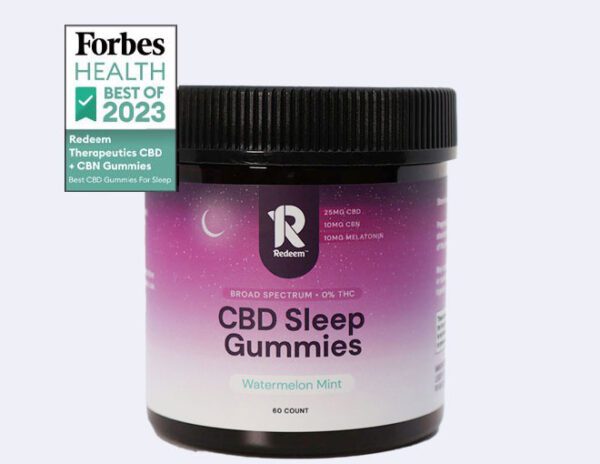Your Cart Details
By Angela Queen | Aug 25, 2025
How the Natural Sleep Aid CBD Supports Deep, Restorative Sleep
How the Natural Sleep Aid CBD Supports Deep, Restorative Sleep
By Angela Queen | Aug 25, 2025
Struggling With Sleep? You’re Not Alone.
Sleep is one of the most fundamental pillars of health, yet an alarming number of adults suffer from sleep disorders or chronic difficulties with rest. According to the Centers for Disease Control and Prevention, more than one in three Americans reports poor sleep on a regular basis. For some, the challenge lies in falling asleep; for others, it’s the frustrating cycle of sleep waking throughout the night or waking unrefreshed even after many hours in bed.
Traditional sleep medications often provide only short-term relief and may cause residual grogginess, tolerance, or dependency. Melatonin supplements are widely used as a natural sleep aid, but for many individuals, melatonin alone is not enough to restore balance. Increasingly, people are turning to cannabidiol (CBD)—a non-intoxicating compound derived from the cannabis plant—to address not just the symptom of sleeplessness, but also its underlying causes.
How Cannabidiol (CBD) Works in the Body
Cannabidiol interacts with the body’s endocannabinoid system (ECS), a complex network of receptors (CB1 and CB2), enzymes, and signaling molecules. The ECS regulates homeostasis across key processes such as mood, appetite, immune response, and sleep cycles. By modulating this system, CBD exerts wide-ranging effects that can support quality of sleep.
Unlike tetrahydrocannabinol (THC), CBD does not produce a euphoric “high.” Instead, research indicates that CBD may act as a neuromodulator, influencing serotonin receptors, GABA activity, and cortisol levels. These actions explain why studies suggest CBD reduces anxiety and promotes a calmer state before bedtime. In essence, CBD helps the body and mind move into a state conducive to natural sleep.
The Sedative Effect of CBD: Myth or Science?
One common misconception is that CBD itself is inherently sedative, like a pharmaceutical sleeping pill. In reality, CBD appears to exert an indirect sedative effect by addressing the factors that undermine sleep—such as stress, chronic pain, or inflammation.
- Reduces anxiety: A landmark study showed that a dose of CBD (300 mg) significantly decreased anxiety in individuals before a public speaking test. Lower anxiety levels before bedtime translate into improved sleep latency.
- Eases chronic pain: For individuals with medical conditions like arthritis, fibromyalgia, or neuropathy, pain is a primary barrier to sleep. CBD’s anti-inflammatory properties may provide relief that allows for more restful nights.
- Balances REM cycles: Animal studies and early human research suggest CBD can modulate REM sleep, potentially leading to deeper, more restorative rest.
Thus, CBD does not “knock you out” in the way that sedatives or high doses of antihistamines do. Instead, it supports the body in achieving natural sleep rhythms.
CBD vs. Melatonin: Different Tools for Different Problems
Melatonin supplements work by signaling the body’s circadian clock—it essentially tells your system, “It’s time for sleep.” This can be particularly effective for individuals with jet lag, night-shift work, or mild insomnia. However, melatonin does not address the reasons someone may feel too wired or tense to sleep.
CBD, on the other hand, helps manage medical conditions that underlie insomnia, such as anxiety, chronic pain, or even hormonal dysregulation. Many people find that combining low doses of melatonin with CBD creates a synergistic effect: melatonin provides the “when,” while CBD addresses the “why.”
This distinction explains why CBD users often report waking up refreshed and clear-headed, while melatonin sometimes leaves residual grogginess the next morning. Now let’s learn how does CBD help you sleep.
What the Research Says: CBD and Sleep Disorders
Although more large-scale trials are needed, current findings are promising:
- Insomnia: Several small clinical trials have demonstrated that CBD may reduce sleep latency (the time it takes to fall asleep) and decrease nighttime awakenings.
- REM sleep behavior disorder: In patients with Parkinson’s disease, CBD has shown benefit in reducing abnormal muscle activity during REM sleep.
- PTSD and anxiety-related sleep disturbances: CBD appears to reduce hyperarousal and nightmares, leading to more stable quality of sleep.
- Chronic pain conditions: By addressing inflammation and neuropathic pain, CBD may indirectly improve sleep outcomes.
Importantly, the Food and Drug Administration has not yet approved CBD as a treatment for insomnia or sleep disorders. While CBD has been approved in the form of Epidiolex for certain seizure disorders, all other uses remain in the realm of dietary supplements. Consumers should be mindful that CBD is not yet federally regulated for sleep, though studies suggest clear potential.
Short Term vs. Long Term Use of CBD for Sleep
A key question many people ask is whether CBD is better suited for short term or long term sleep challenges.
- Short term: Individuals facing temporary stress, jet lag, or acute insomnia may find that small to moderate doses of CBD are enough to encourage a good night of rest.
- Long term: For those with ongoing medical conditions, chronic pain, or persistent anxiety, consistent CBD use may offer cumulative benefits. Early research suggests CBD maintains its efficacy without the tolerance issues commonly seen with pharmaceutical sleep aids.
Nevertheless, high doses may occasionally cause side effects such as digestive upset or fatigue. Therefore, it is advisable to begin with a lower dose of CBD and gradually increase as needed, ideally under the guidance of a healthcare professional.
Choosing the Right CBD Product for Sleep
When considering CBD for sleep, product selection is crucial. Variables include bioavailability, onset time, and duration of effect.
- CBD Gummies: A popular option, gummies combine CBD with calming botanicals such as chamomile or passionflower. They are convenient, palatable, and support gradual absorption for sustained quality of sleep.
- Sleep Softgels: Offering precise dosing, softgels deliver a consistent amount of CBD. They are ideal for those seeking reliable results without guesswork.
- CBD Tinctures or Oils: These provide flexibility in adjusting dosage and offer relatively fast absorption when taken sublingually.
- Broad-Spectrum vs. Full-Spectrum: Products containing a wide array of cannabinoids and terpenes may enhance the sedative effect through what is known as the “entourage effect.”
At Redeem Rx, our CBD Sleep Gummies and CBD Sleep Softgels are specifically formulated to promote deep, restorative sleep. Each product undergoes third-party testing to ensure purity, potency, and safety.
👉 Explore them here: [CBD Sleep Gummies] + [CBD Sleep Softgels]
CBD Sleep Gummies with CBN, Melatonin & Botanicals
Practical Tips for Using CBD as a Natural Sleep Aid
To maximize results, consider the following evidence-based strategies:
- Timing matters: Take your dose of CBD 30–60 minutes before bedtime to align with your natural circadian rhythm.
- Pair with lifestyle practices: Enhance CBD’s effects by incorporating good sleep hygiene—dim lights in the evening, avoid blue light exposure, and keep a consistent bedtime routine.
- Start low, go slow: Begin with a modest dose of CBD (10–25 mg) and increase gradually until you achieve the desired quality of sleep.
- Consider synergy: For some individuals, combining CBD with small amounts of melatonin or magnesium enhances the sedative effect.
- Monitor long term: Track how CBD affects your sleep patterns over weeks and months. Some users find it beneficial for short term use, while others rely on it as part of a long term wellness routine.
Final Thoughts: Toward a Restful Future
Better sleep is not a luxury—it is a foundation for physical, emotional, and cognitive well-being. While conventional pharmaceuticals and even melatonin supplements provide relief for some, they often fail to address the root causes of poor sleep. CBD offers a more holistic approach: it calms the nervous system, eases chronic pain, and promotes the conditions for natural sleep.
Though the Food and Drug Administration has yet to formally endorse CBD for sleep disorders, a growing body of research indicates that this natural sleep aid holds promise for millions of people seeking an alternative to synthetic sedatives. Whether used for short term challenges or as part of a long term wellness plan, CBD has the potential to transform restless nights into a consistent pattern of good night sleep.
At Redeem Rx, our mission is to create CBD formulations that truly enhance life. With thoughtfully designed Sleep Gummies and Softgels, we invite you to experience the difference for yourself—and wake each morning renewed, restored, and ready to thrive.
📌 Disclaimer: These statements have not been evaluated by the Food and Drug Administration. CBD products are not intended to diagnose, treat, cure, or prevent any disease. Always consult with a healthcare professional before starting any new supplement, particularly if you are pregnant, nursing, or taking other medications.
 CBD Gummies
CBD Gummies CBD Oils
CBD Oils CBD Capsules
CBD Capsules CBD Cream
CBD Cream CBD for Pets
CBD for Pets CBD + THC Gummies
CBD + THC Gummies Delta 8 Gummies
Delta 8 Gummies Delta 8 Capsules
Delta 8 Capsules Full Spectrum CBD Oil
Full Spectrum CBD Oil  THC Drops
THC Drops Stress
Stress

